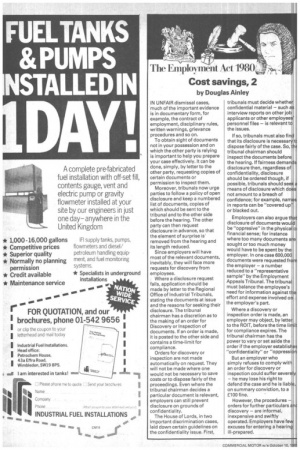The Employment Act 1980 Cost savings, 2
Page 56

If you've noticed an error in this article please click here to report it so we can fix it.
by Douglas Ainley
IN UNFAIR dismissal cases, 'much of the important evidence is in documentary form, for example, the contract of employment, disciplinary rules, written warnings, grievance procedures and so on.
To obtain sight of documents not in your possession and on which the other party is relying is important to help you prepare your case effectively. It can be done, simply, by letter to the other party, requesting copies of certain documents or permission to inspect them.
Moreover, tribunals now urge parties to follow a policy of open disclosure and keep a numbered list of documents, copies of which should be sent to the tribunal and to the other side before the hearing. The other party can then request disclosure in advance, so that the element of surprise is removed from the hearing and its length reduced.
Since employers will have most of the relevant documents, inevitably, they will face more requests for discovery from employees.
Where a disclosure request fails, application should be made by letter to the Regional Office of Industrial Tribunals, stating the documents at issue and the reasons for seeking their disclosure. The tribunal chairman has a discretion as to the making of an order for Discovery or Inspection of documents. If an order is made, it is posted to the other side and contains a time-limit for compliance.
Orders for discovery or inspection are not made automatically on request. They will not be made where one would not be necessary to save costs or to dispose fairly of the proceedings. Even where the tribunal chairman decides a particular document is relevant, employers can still prevent disclosure on grounds of confidentiality.
The House of Lords, in two important discrimination cases, laid down certain guidelines on the confidentiality issue. First, tribunals must decide whether confidential material — such as interview reports on other job applicants or other employees' personnel files — is relevant to 1 the issues.
If so, tribunals must also find that its disclosure is necessary ti dispose fairly of the case. So, th0 tribunal chairman should inspect the documents before the hearing. If fairness demandi disclosure then, regardless of 1 confidentiality, disclosure should be ordered though, if possible, tribunals should seek 0 means of disclosure which does not amount to a breach of confidence; for example, names in reports can be "covered up" or blacked out.
• Employers can also argue that disclosure of documents would be "oppresive" in the physical al financial sense; for instance where too many documents are sought or too much money would have to be spent by the employer. In one case 600,000 documents were requested from" the employer — a number reduced to a "representative sample" by the Employment I Appeals Tribunal. The tribunal must balance the employee's need for information against thei effort and expense involved on the employer's part.
Where a discovery or inspection order is made, an employer may object, by letter to the ROIT, before the time limit for compliance expires. The tribunal chairman has the power to vary or set aside the order if the employer establishes "confidentiality" or "oppression But an employer who
simply refuses to comply with an order for discovery or inspection could suffer severely — he may lose his right to defend the case and he is liablel on summary conviction, to a £100 fine.
However, the procedures orders for further particulars any discovery — are informal, inexpensive and swiftly operated. Employers have fe‘.6,4 excuses for entering a hearini;
ill-prepared.
























































